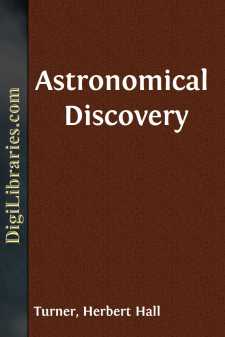Categories
- Antiques & Collectibles 13
- Architecture 36
- Art 48
- Bibles 22
- Biography & Autobiography 813
- Body, Mind & Spirit 142
- Business & Economics 28
- Children's Books 16
- Children's Fiction 13
- Computers 4
- Cooking 94
- Crafts & Hobbies 4
- Drama 346
- Education 46
- Family & Relationships 57
- Fiction 11829
- Games 19
- Gardening 17
- Health & Fitness 34
- History 1377
- House & Home 1
- Humor 147
- Juvenile Fiction 1873
- Juvenile Nonfiction 202
- Language Arts & Disciplines 88
- Law 16
- Literary Collections 686
- Literary Criticism 179
- Mathematics 13
- Medical 41
- Music 40
- Nature 179
- Non-Classifiable 1768
- Performing Arts 7
- Periodicals 1453
- Philosophy 64
- Photography 2
- Poetry 896
- Political Science 203
- Psychology 42
- Reference 154
- Religion 513
- Science 126
- Self-Help 84
- Social Science 81
- Sports & Recreation 34
- Study Aids 3
- Technology & Engineering 59
- Transportation 23
- Travel 463
- True Crime 29
Astronomical Discovery
Description:
Excerpt
CHAPTER I
URANUS AND EROS
Popular view of discovery.Discovery is expected from an astronomer. The lay mind scarcely thinks of a naturalist nowadays discovering new animals, or of a chemist as finding new elements save on rare occasions; but it does think of the astronomer as making discoveries. The popular imagination pictures him spending the whole night in watching the skies from a high tower through a long telescope, occasionally rewarded by the finding of something new, without much mental effort. I propose to compare with this romantic picture some of the actual facts, some of the ways in which discoveries are really made; and if we find that the image and the reality differ, I hope that the romance will nevertheless not be thereby destroyed, but may adapt itself to conditions more closely resembling the facts.
Keats’ lines.The popular conception finds expression in the lines of Keats:—
Then felt I like some watcher of the skies
When a new planet swims into his ken.
Keats was born in 1795, published his first volume of poems in 1817, and died in 1821. At the time when he wrote the discovery of planets was comparatively novel in human experience. Uranus had been found by William Herschel in 1781, and in the years 1800 to 1807 followed the first four minor planets, a number destined to remain without additions for nearly forty years. It would be absurd to read any exact allusion into the words quoted, when we remember the whole circumstances under which they were written; but perhaps I may be forgiven if I compare them especially with the actual discovery of the planet Uranus, for the reason that this was by far the largest of the five—far larger than any other planet known except Jupiter and Saturn, while the others were far smaller—and that Keats is using throughout the poem metaphors drawn from the first glimpses of “vast expanses” of land or water. Perhaps I may reproduce the whole sonnet. His friend C. C. Clarke had put before him Chapman’s “paraphrase” of Homer, and they sat up till daylight to read it, “Keats shouting with delight as some passage of especial energy struck his imagination. At ten o’clock the next morning Mr. Clarke found the sonnet on his breakfast-table.”
Sonnet XI
On first looking into Chapman’s “Homer”
And many goodly states and kingdoms seen;
Round many western islands have I been
Which bards in fealty to Apollo hold.
Oft of one wide expanse had I been told
That deep-brow’d Homer ruled as his demesne;
Yet did I never breathe its pure serene
Till I heard Chapman speak out loud and bold:
Then felt I like some watcher of the skies
When a new planet swims into his ken;
Or like stout Cortez when with eagle eyes
He star’d at the Pacific—and all his men
Look’d at each other with a wild surmise—
Silent, upon a peak in Darien.
Comparison with discovery of Uranus.Let us then, as our first example of the way in which astronomical discoveries are made, turn to the discovery of the planet Uranus, and see how it corresponds with the popular conception as voiced by Keats. In one respect his words are true to the life or the letter. If ever there was a “watcher of the skies,” William Herschel was entitled to the name. It was his custom to watch them the whole night through, from the earliest possible moment to daybreak; and the fruits of his labours were many and various almost beyond belief. But did the planet “swim into his ken”? Let us turn to the original announcement of his discovery as given in the Philosophical Transactions for 1781.
PHILOSOPHICAL TRANSACTIONS, 1781
XXXII.—Account of a Comet
By Mr. Herschel, F.R.S.
(Communicated by Dr. Watson, jun., of Bath, F.R.S.)
Read April 26, 1781
“On Tuesday the 13th of March, between ten and eleven in the evening, while I was examining the small stars in the neighbourhood of H Geminorum, I perceived one that appeared visibly larger than the rest; being struck with its uncommon magnitude, I compared it to H Geminorum and the small star in the quartile between Auriga and Gemini, and finding it to be so much larger than either of them, suspected it to be a comet....


